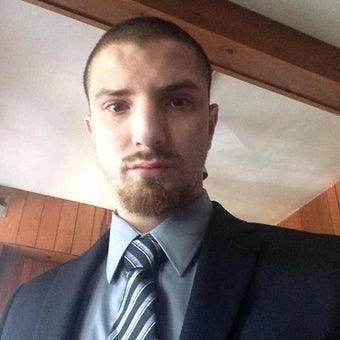Baseball legend Willie Mays dead at 93 years old
Senior congressional correspondent Chad Pergram reports the latest from Capitol Hill.
Willie Mays bought a 15-room mansion in a New York City suburb to escape housing discrimination in San Francisco and remained under the radar, as rumors swirled about a crumbling marriage.
When the New York Giants moved to the Bay Area in 1957, buyers didn't want to sell to Mays, despite his superstar fame, because owners "stand to lose a lot if colored people move in," Mays said in an interview, according to James Hirsch's biography about Mays' life.
"Down in Alabama where we come from, you know your place," Mays said in an interview, according to Hirsch. "But up here, it's a lot of camouflage. They grin in your face and deceive you."
The racist housing debacle made national headlines, which he wanted to avoid. He bought a castle-like home 3,000 miles away in New Rochelle, New York, for $75,000 in 1960 from Samuel and Pauline Zaretsky, according to the deed obtained by Fox News Digital.
JOHNNY BENCH'S FUNNY STORY ABOUT WILLIE MAYS
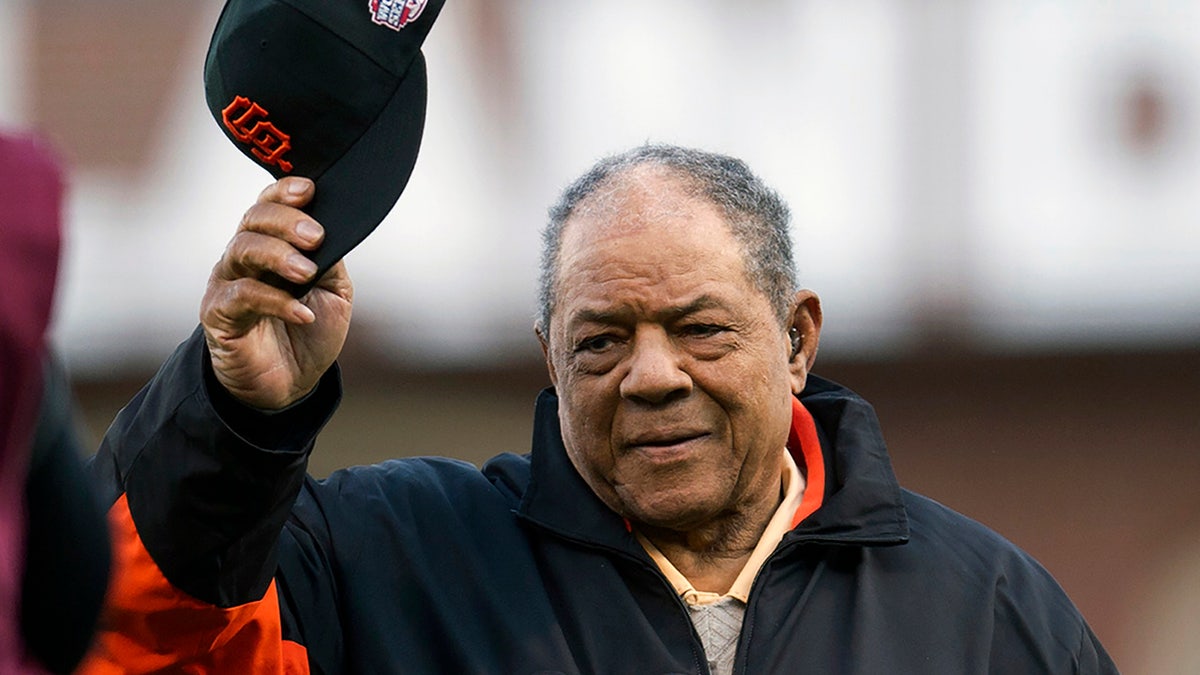
Hall of Famer Willie Mays tips his cap during introductions for the first game of the World Series between the Giants and the Detroit Tigers on Oct. 24, 2012, in San Francisco. (Paul Kitagaki Jr./The Sacramento Bee via AP, File)
New Rochelle, nicknamed the "Queen City of the Sound," is about 30 minutes north of Midtown Manhattan and is the seventh most populated city in New York state.
Mays and his first wife, Margherite, were among the first Black families who moved into the upscale, secluded section of the north end of the city.
The headline in The New York Times on May 28, 1960, read, "WILLIE MAYS BUYS WESTCHESTER HOME; Neighbors in New Rochelle Welcome Negro Family to $75,000 Stone House."
BOB COSTAS REVEALS WHICH MLB PLAYERS - 2 CURRENT, 3 RECENTLY RETIRED - REMINDS HIM OF MAYS
City historian Barbara Davis told Fox News Digital that they mostly stayed to themselves and lived in the city for a short time.
Mays traveled coast to coast between his rental home in San Francisco and his New Rochelle palace, which is estimated to be worth about $2 million today.
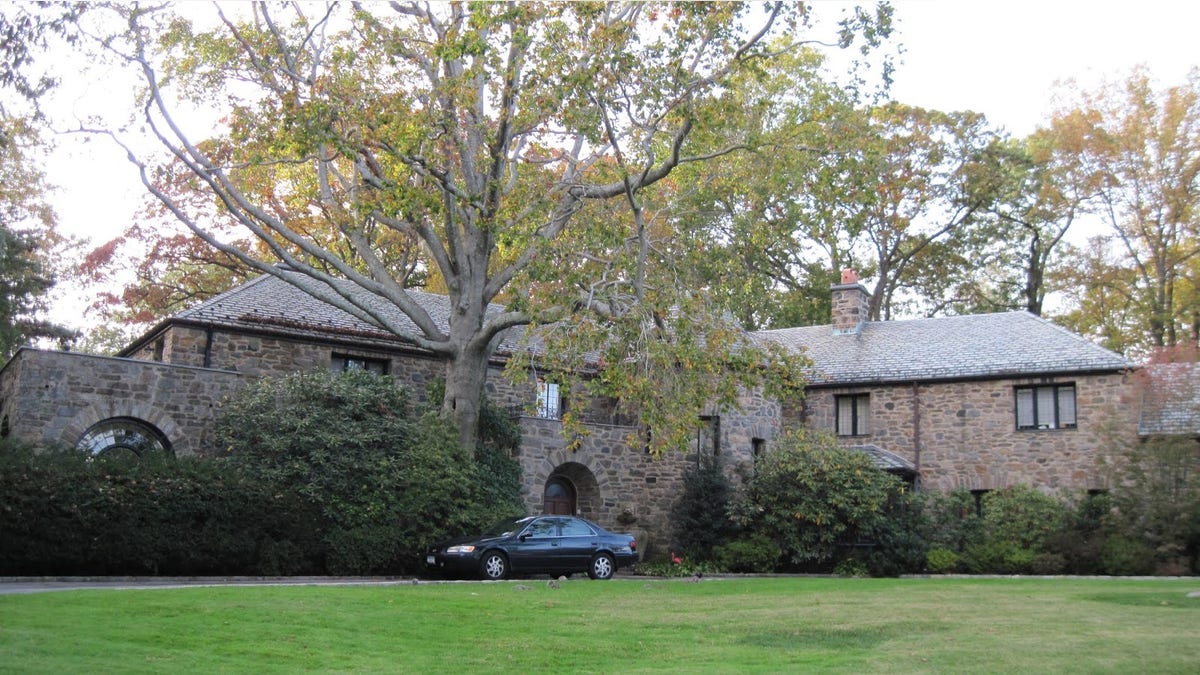
Willie Mays bought this home in New Rochelle in 1960 after encountering racist housing practices in San Francisco following the Giants' move from the Big Apple to the Bay Area. (New Rochelle Public Library)
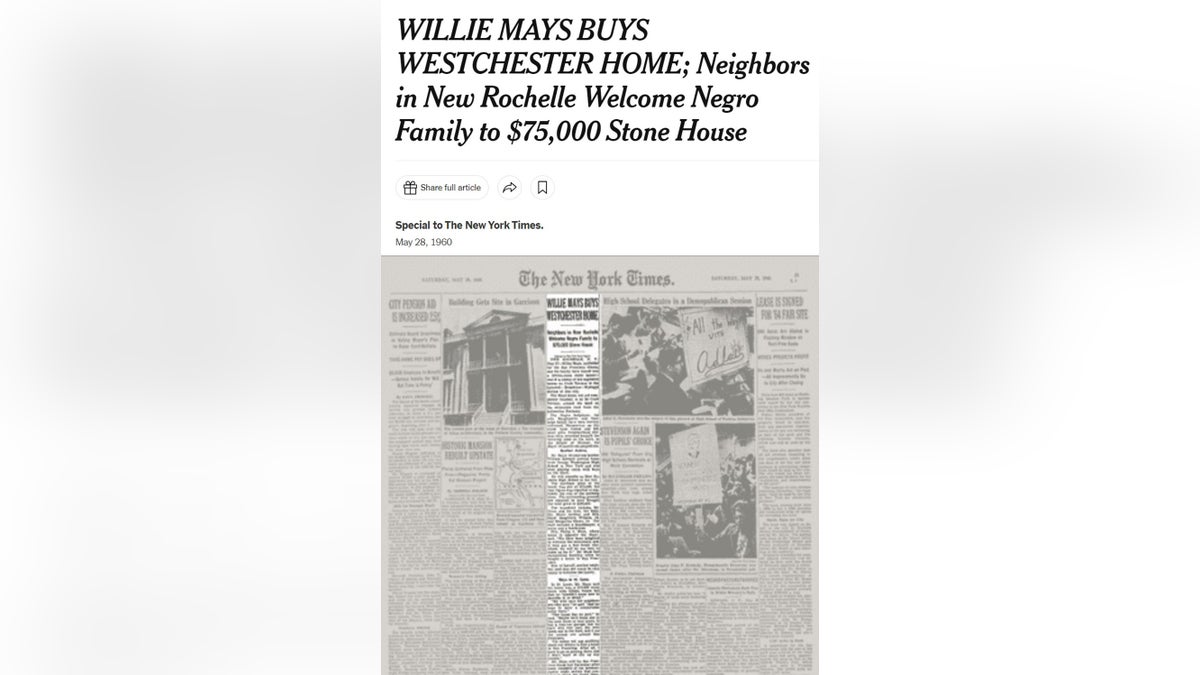
The headline in The New York Times in May 1960 about Willie Mays buying a home in a New York City suburb. (New York Times Archives)
Mays is honored in the city's walk of fame outside the public library, along with other baseball greats like Mariano Rivera and Lou Gehrig, and cultural icons like Ruby Dee.
"New Rochelle can be proud to claim an association with part of this baseball history, as Willie Mays, the ‘Say Hey Kid,’ lived in a 15-room Normandy style mansion at 90 Croft Terrace in the early 1960s," his plaque read.
BARRY BONDS, WILLIE MAYS' GODSON, POSTS TRIBUTE TO FELLOW GIANTS LEGEND
The plaque includes blurbs about his childhood in Alabama, stats of arguably one of the greatest players ever and, of course, a reference to "The Catch," the iconic image of Mays running to dead center field to catch a fly ball directly over his head in the 1954 World Series.
The baseball legend's death last week seemingly brought the nation together.
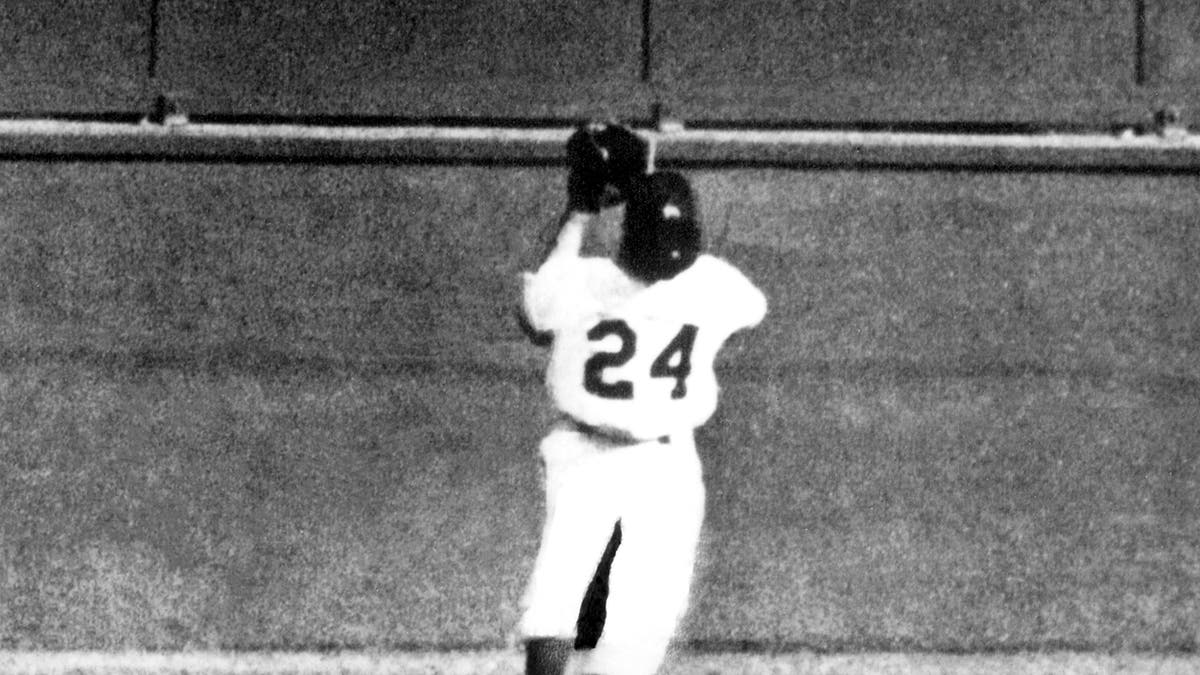
Willie Mays of the New York Giants goes back to catch the ball hit by Vic Wertz of the Cleveland Indians during the World Series on Sept. 29, 1954, at the Polo Grounds in New York. (Bruce Bennett Studios via Getty Images Studios/Getty Images)
READ: DEED OBTAINED BY FOX NEWS DIGITAL
Like Mays' reported comment about "camouflaged" racism in San Francisco, the gorgeous home hid turbulent times in Mays' first marriage, according to Hirsch's biography.
About a year or two before the Mays family moved to New Rochelle, Margherite downplayed rumors of a crumbling marriage.
CLICK HERE FOR MORE SPORTS COVERAGE ON FOXNEWS.COM
They went through a public separation that included allegations of Mays' ex-wife's lavish spending habits. Their seven-year marriage, from 1956 to 1963, ended in divorce.
Their animosity toward each other was detailed in the reporter's biography – titled "Willie Mays. The Life. The Legend," including instances where Mays slept at the opposite end of the home.
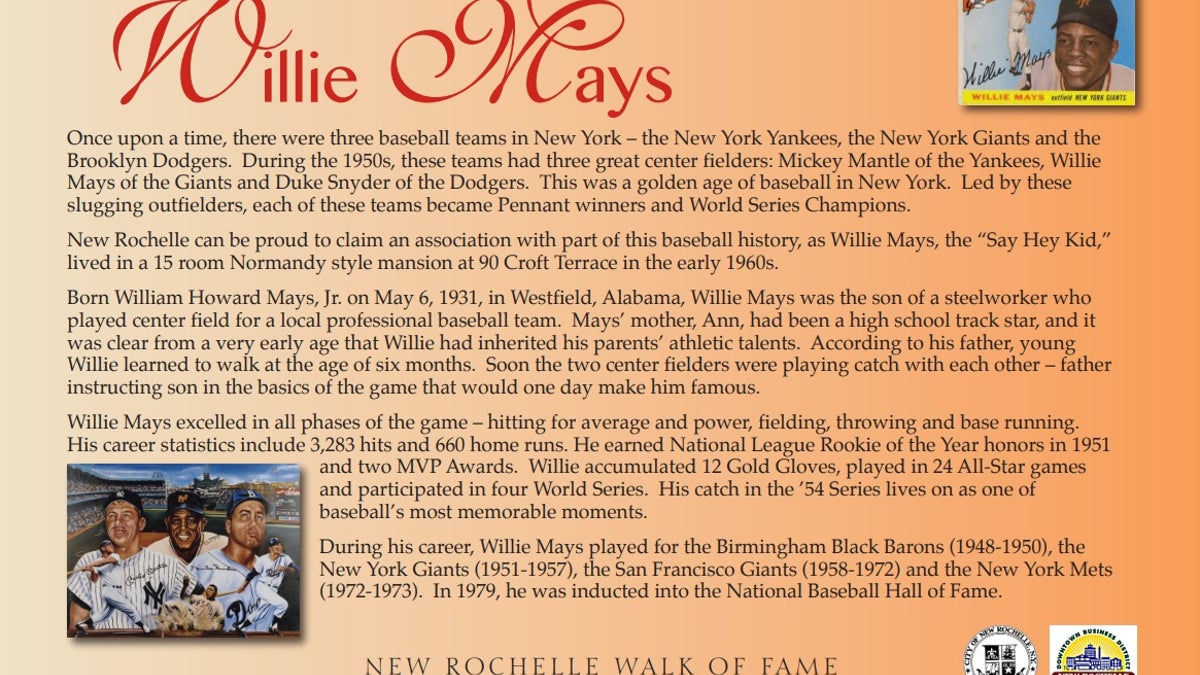
The Walk of Honor plaque for Willie Mays in New Rochelle, New York, walk of fame. (City of New Rochelle)
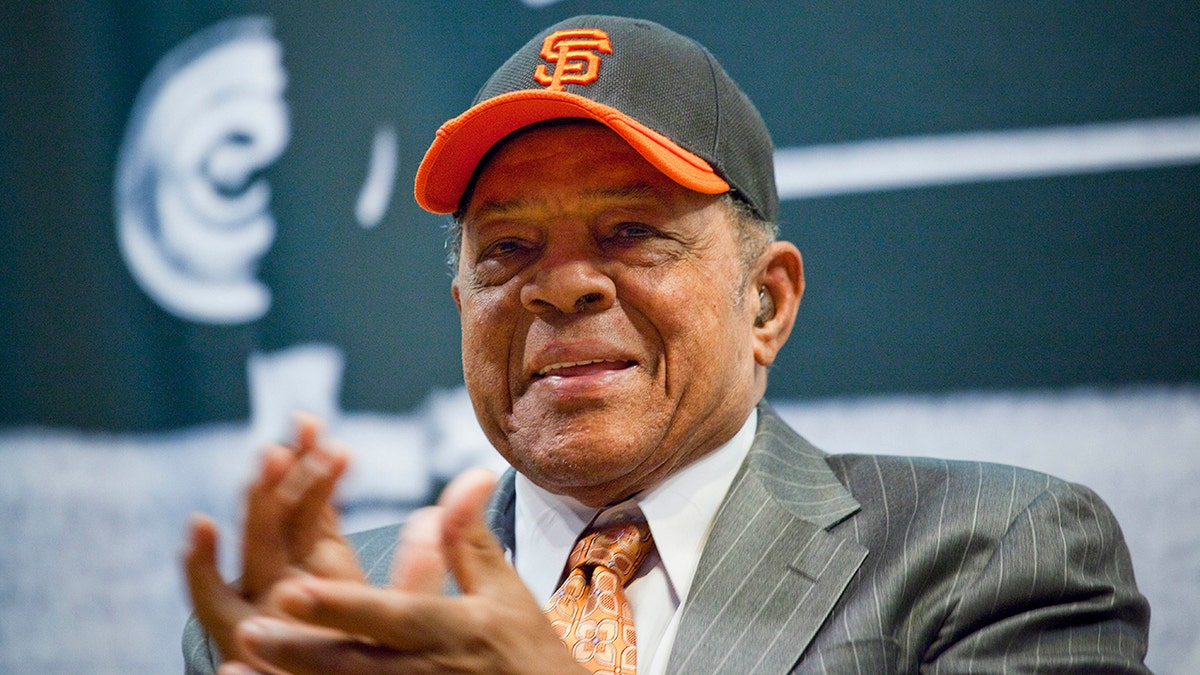
Willie Mays visits PS 46 in Harlem, next to the site of the former Polo Grounds, where the New York Giants played before moving to San Francisco in 1958, on Jan. 21, 2011 in New York City. (Michael Nagle/Getty Images)
Mays remarried to Mae Louise Allen. They were together until she died in April 2013 at the age of 74, and Margherite died at the age of 84 in Fort Lauderdale, Florida, in July 2010.
As for his playing days, Mays' career stats include 3,283 hits, 660 home runs, a career .301 batting average, 1,909 RBIs and 339 stolen bases.
He still holds the MLB record for most putouts by an outfielder with 7,095. In fact, he's the only outfielder to record over 7,000 career putouts.
CLICK HERE TO GET THE FOX NEWS APP
He played for the Birmingham Black Barons in the Negro Leagues from 1948-1950, the New York Giants from 1951-1957 (with a two-year gap in ‘52 and ’53, when he served in the U.S. Army), the San Francisco Giants from 1958-1972, and the New York Mets from 1972-1973.
He was inducted into the National Baseball Hall of Fame in 1979, and into the New Rochelle Walk of Fame in 2014. President Barack Obama presented Mays with the Presidential Medal of Freedom in 2015.
Follow Fox News Digital’s sports coverage on X and subscribe to the Fox News Sports Huddle newsletter.
